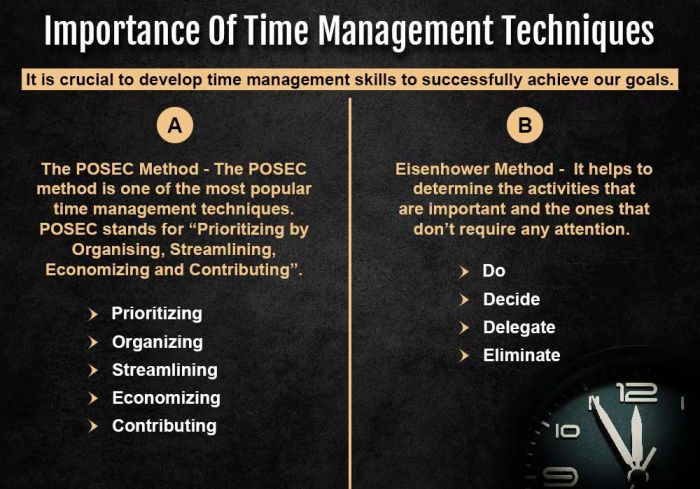Time management is a process that involves planning and organizing tasks in order of importance and urgency. It is a person’s ability to use their time effectively and productively through effective time management techniques.
Importance Of Time Management Techniques

A 2009 study 1 Jackson VP. Time management: a realistic approach. J Am Coll Radiol. 2009 Jun;6(6):434-6. doi: 10.1016/j.jacr.2008.11.018. PMID: 19467489. pointed out that realistic time management and organizational plans can improve productivity and quality of life. Another 2019 study 2 Adams, R. V., & Blair, E. (2019). Impact of time management behaviors on undergraduate engineering students’ performance. SAGE Open, 9(1), 215824401882450. https://doi.org/10.1177/2158244018824506 found that effective time management is associated with greater academic performance and lower levels of anxiety in students. It is crucial to develop time management skills to successfully achieve our goals. In order to do this, there are several time management techniques that can be used. Some of these are as follows:
Read More About Generalized Anxiety Disorder Here.
A. The POSEC Method
The POSEC method is one of the most popular time management techniques. POSEC stands for “Prioritizing by Organising, Streamlining, Economizing and Contributing”. The different role of the POSEC method is explained below:
1. Prioritizing
This means that all the tasks assigned require prioritization. It is essential to note down all the important tasks. It also involves how you use your time to complete all the goals you set out. Allocation of tasks must depend on the degree of priority.
2. Organizing
The second aspect of this time management technique is organizing. After prioritizing all your tasks, it is essential to organize them. This involves making a plan to achieve the goals you set out. This will allow an individual to feel more stable and secure. It is important to follow the plan regularly to successfully complete your tasks.
3. Streamlining
This aspect involves streamlining all the things you don’t like doing but must do. These tasks involve jobs such as work or chores that are essential to function daily. Streamlining helps in managing and maintenance of personal stability and security.
4. Economizing
The fourth aspect of this time management technique is economizing. This involves all the enjoyable things that must be done for recreation. These activities include socializing and engaging in different pastimes.
5. Contributing
The last aspect of the POSEC method is contributing. Contributing involves what you give back to the community or the world. It is linked to social obligations that one must follow.
POSEC is one of the crucial time management techniques that offer a clear guide on how to prioritize your goals in life. This method was created in order to build personal efficiency and for better effectiveness of a team working together. It also provides guidelines for the management to set employee goals in order of significance.
B. Eisenhower Method
This method involves the prioritization of tasks according to their urgency. It helps to determine the activities that are important and the ones that don’t require any attention. This time management technique was developed by Dwight D. Eisenhower. He said, “most things which are urgent are not important, and most things which are important are not urgent.” It is also known as the Eisenhower matrix. The Eisenhower matrix is one of the most widely used time management techniques around the globe.
The Eisenhower matrix 3 Ngandam Mfondoum, Alfred Homere & Tchindjang, Mesmin & Mfondoum, Valery & Makouet, Isabelle. (2019). Eisenhower matrix * Saaty AHP = Strong actions prioritization? Theoretical literature and lessons drawn from empirical evidences. VOLUME II. 13 – 27. is categorized into 4 quadrants according to what one needs to do during the day. These quadrants are:
1. Do
The first quadrant of this time management technique, “do”, consists of the most important tasks that you should do. These tasks need to be done urgently. They include the tasks that have a deadline or the ones that cannot be delayed. It is essential to thoroughly analyze each task to determine whether it fits into this category. If the task needs to be done within a day or two, then it is considered an urgent task.
2. Decide
The second quadrant of the Eisenhower method is “decide”. It usually consists of tasks that are important but not necessarily urgent. This includes a wide range of responsibilities such as professional emails, follow-ups, or any personal appointments. Tasks in this quadrant can be scheduled some other time. A common example is exercising regularly. We all know that it is beneficial to our health. But not everyone can dedicate time to it. Hence, it becomes essential to decide what time you should hit the gym or go for a run. Employing good time management techniques can go a long way in managing tasks efficiently.
3. Delegate
The third quadrant of this time management technique is “delegate”. This category involves tasks that are not important but urgent. Even though the tasks may be important, it is not necessary for them to be urgent. They don’t really contribute much towards productivity. Hence, it is up to you to decide whether you need to delegate or reschedule it. Examples include scheduling interviews, replying to emails, or team meetings.
4. Eliminate
The last quadrant of this matrix is “eliminate”. These tasks do not contribute to the goals. So it is essential to identify these tasks and eliminate them to ensure productivity. For example, surfing on social media or checking the phone constantly to check for messages.
Great time management means being effective as well as efficient. We must spend our time doing tasks that are important and not just the ones that are urgent.
The Goal Of Time Management Techniques
Time management techniques are only beneficial when we successfully categorize tasks according to their importance and urgency. When we know which activities are important and urgent, we can redirect our focus away from unimportant and non-urgent tasks.











